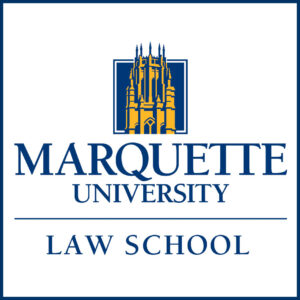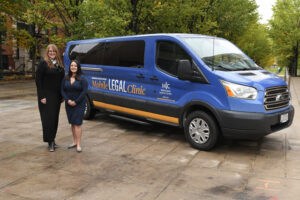The Marquette Volunteer Legal Clinic(s)—A True Legal Community Effort
 The spirit and ideals underlying Marquette Law School’s embrace of pro bono work are timeless—part of our Catholic, Jesuit heritage and mission and reflecting the best traditions of the legal profession. Yet there are some key dates in our history, and, without doubt, one of them is from just more than 20 years ago.
The spirit and ideals underlying Marquette Law School’s embrace of pro bono work are timeless—part of our Catholic, Jesuit heritage and mission and reflecting the best traditions of the legal profession. Yet there are some key dates in our history, and, without doubt, one of them is from just more than 20 years ago.
Specifically, in 2001, a group of individuals began the Marquette Volunteer Legal Clinic (MVLC). Julie Darnieder, L’78, alluded to this background in a blog post a number of years later, and I remain grateful to all of the individuals involved in launching the initiative.
My purpose here is not to recount the story but rather—on the cusp of the ABA’s National Celebration of Pro Bono week—first to note the continuing prominence of the MVLC in our now much-expanded pro bono work. Indeed, Angela F. Schultz, assistant dean for public service, has taught me to refer to the MVLCs (plural). For we now offer the following locations (and times):
- Mondays, 1:00–3:00 p.m., on Zoom
- Mondays, 4:00–6:00 p.m., at the Milwaukee County Veterans Service Office
- Tuesdays, 1:00–3:00 p.m., at the House of Peace
- Wednesdays, 1:30–3:30 p.m., at the Milwaukee Justice Center
- Wednesdays, 5:00–7:00 p.m., at the United Community Center
- Thursdays & Fridays, 9:00–11:00 a.m., at the Milwaukee Justice Center
- Thursdays, 1:00–3:00 p.m., on Zoom
- And host sites interested in bringing the legal clinic services to them can request a visit from volunteers on the Mobile Legal Clinic.
Permit me to emphasize, second, that we are dependent on—and grateful to—the many lawyers in this community who enable us to operate the MVLCs. After all, our students, who are there with them, do not yet have law licenses.
The lawyers volunteering each day come from a range of practices, law schools, and experiences. Some volunteers have had long careers—Herb Bratt, retired from full-time law practice but a frequent volunteer, graduated from Yale Law School in 1956. Others are newer to the practice: Jordan Jozwik, an associate at Reinhart Boerner Van Deuren, graduated from Marquette Law School in May 2022. Within weeks, she had done her first MVLC shift—as an attorney (she volunteered often as a law student).
Remarkably, of the 230 lawyer volunteers in the past year, exactly 115 were Marquette lawyers, while the other half graduated from other law schools. The latter group would form a long list, including the law schools at universities such as Cornell, Creighton, Duke, Emory, Georgetown, Harvard, Indiana, Iowa, Michigan, Northwestern, Tulsa, Vermont, William Mitchell, and Wisconsin (Madison).
We recently surveyed all these lawyers about their “reasons for engaging in pro bono with the Marquette Volunteer Legal Clinics.” Simply stated here, it is evident that all of them regard it as a privilege to serve the MVLC clients (in the brief-legal-advice format of the clinic) and to help develop the knowledge, skills, and values of our students.
Indeed, a prevailing theme is that the practicing lawyers regard themselves as getting more than they are giving from the experience. From the Marquette Law School end, truly, we could not operate the MVLCs without the many civic-minded lawyers in this area who already know, from their volunteering, “how great this is” (in the words of one respondent to the recent survey).
Kudos—and thank you—to all our attorney volunteers. To learn how to join with them—and with our students—by volunteering with the Marquette Volunteer Legal Clinics, visit our website.


 Early this semester, I had the privilege of meeting with Marquette law students who this past summer held
Early this semester, I had the privilege of meeting with Marquette law students who this past summer held